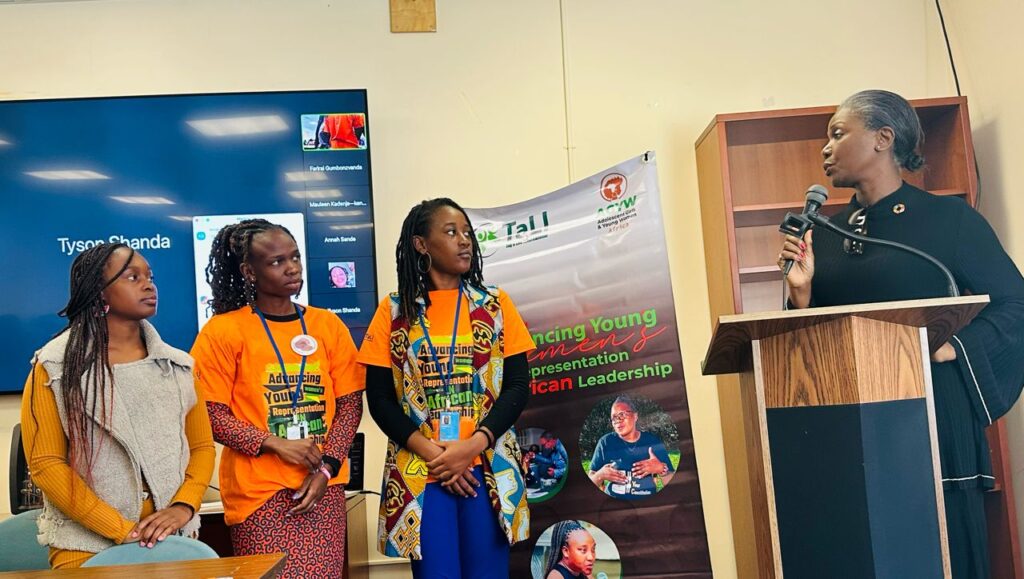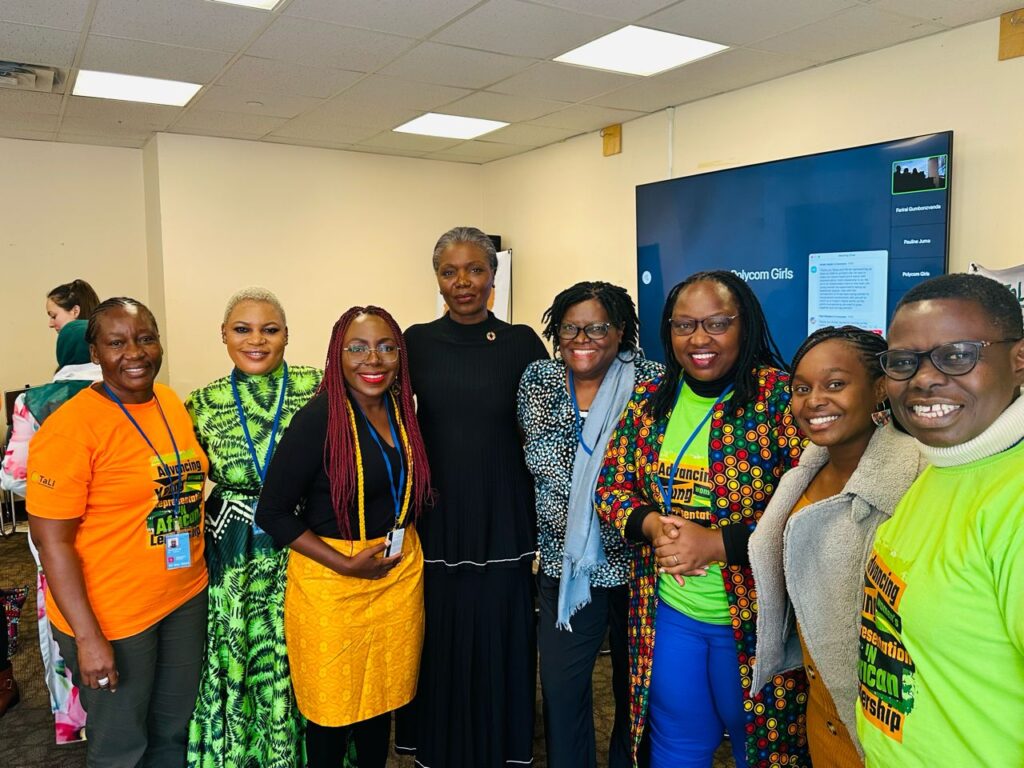
The Tag a Life International and AGYW Africa Network’s inaugural ‘Advancing Young Women’s Representation in African Leadership’ parallel side event at the 68th Commission on the Status of Women (CSW68) in New York was a resounding success as a full house attended and listened to young women and their seniors speak on their issues and goals for Africa. In relation to the CSW68 theme of addressing poverty and strengthening institutions and financing with a gender perspective, young women spoke on a panel discussing the issues faced by young women in Africa in terms of poverty and lack of access and opportunities. Solidifying the plight of the young women, an intergenerational solidarity panel of senior women committed to supporting young women and strengthening the intergenerational relationships in the women’s movement, for the sake of the African girl child’s empowerment.
TaLI, along with its partners, Rozaria Memorial Trust, SRHR Africa Trust, Institute of Women Social Workers, Zimbabwe Women’s Resource Center and Network, the Women’s Academy for Political Leadership and Excellence (WALPE), Polycom Development Project and Raising Teenagers collaborated to bring young women to CSW68 and create a space for a unified women’s movement, with young women leading the conversation. The event was moderated by Ms. Nyaradzo Mashayamombe, the AGYW Africa Convener and Executive Director of TaLI, who has dedicated her work to the empowerment of girls and young women to the amplification of their voices in national, regional, and international spaces. Tanya Mbofana, a member of the AGYW Africa representative of young women moderated with her.
In her opening remarks, Ms. Nyaradzo Mashayamombe alluded to the fact that young women and girls are excluded from leadership and their issues are often viewed as an afterthought. Where women’s vulnerabilities are recorded, adolescent girls and young women in Africa are worse off on the distributive justice chain. Therefore, Ms. Mashayamombe stated that “Africa must invest its resources in young women and we believe as AGYW Africa that whenever African states are making decisions, we want to see data aggregated resources dedicated to girls and young women in Africa and for AGYW to rise and demand their rightful place to hold governments accountable in resource allocation and the enhancement of AGYW rights”. She also made a call to UN Women to think seriously about Adolescent Girls and Young Women in Africa and support their cause.
The young women’s panel raised issues of access, opportunity, and the discrimination of girls ininstitutions of health, finance, and education. The panel also raised the need for ageless positions and spaces; Young women are constantly being made aware of their youth, cutting away from their leadership potential as they are shrunk down in comparison with those they are in the room with. To this point, Melissa Kubvoruno, a young woman from Rozaria Memorial Trust pointed out that with Africa being composed of 60% youth, it’s not plausible to say that 60% of the population is not fit to lead due to their age. Instead, young women must take up leadership, allowing for fair representation and innovative change towards sustainable development. The young women also expressed the need for resource allocation and inclusion of all girls and young women, including those living in rural areas and girls and young women with disabilities. In making the point for the importance of young women’s presence at CSW, Tanya Mbofana, a panellist and member of AGYW Africa from Zimbabwe, stated that she actually felt a lot of pressure as she was representing the many young women who were denied access to CSW whether through denial of VISAS or funding. She emphasized how putting the faces of young women at the forefront was crucial as they have lived realities of poverty and marginalisation and have the capacity to determine how their issues can be
mitigated. At this event, senior women who are directors and leaders in the Women’s movement spoke in
solidarity with young women, emphasising the importance of unity and collaboration in the women’s movement, and the issues of fragmentation in the women’s movement caused by ageism and gatekeeping. Issues of ageism and gatekeeping are prominent and arguably unique to women’s leadership and are never brought up in male leadership, leading to their internalisation by women themselves and a rift between women of different age groups and positions. The senior women then spoke about the importance of socialisation, emphasising the need to raise girls without shaming them for their sex, age, appearance, or capacities. The importance of intergenerational solidarity was also stated as crucial to the women’s movement as young women have to realise how far the women’s movement has come while senior women must open the space for young women to lead and be actively engaged in the movement. One of the women, Jane Anyango of Polycom Development Project Kenya, stated “if you look in this room right now, there are no young women”, showing the lack of representation even amongst attendees of the CSW and emphasizing the need for young women to be included and represented.

The event was graced by Ms Antonia Ngabala-Sodonon, the UN Women Special Representative to the African Union, who received the AGYW Africa Petition to CSW Member States on behalf of UN Women, the convener of the Commission on the Status of Women. Following this event, Ms Antonia also spoke about Generation Equality, an initiative that was launched to fulfil the goals set by the Beijing Platform for Action and the Sustainable Development Goals for gender equality, and how young women can also engage in this initiative so as to have their voices heard as we move towards next steps from
Agenda2030. She stated that “it is time for Africa to increase the number of young women who are ready to take up leadership positions” and that the UN Women is ready to work with and support AGYW Africa to raise more young women taking leadership positions in advancing girls and young women’s rights. Ms Antonia received the petition and shared it within the UN Women’s internal systems, urging AGYW Africa to continue their movement and mobilise young women to continue
engaging in such platforms as CSW.
Further to the event, TaLI engaged the Zimbabwean delegation at the Zimbabwean Embassy in New York, raising awareness of the petition and urging the Zimbabwean delegation to consider this petition in its negotiations at CSW and within the African delegation network. By actively engaging in CSW, young women contributed to the formulation of policies and recommendations that governments adopt at national and international levels to address poverty and the strengthening of institutions. Their involvement helped craft solutions to address systemic challenges, tackle discriminatory practices, and promote the rights and well-being of women and girls. In addition, young African women’s voices at CSW68 brought a new narrative to the CSW conversation, as attendees from various parts of the globe became enlightened to the plight of young
women and looked inward to their own countries and communities and their treatment of young women.
It is the resolve of TaLI and AGYW Africa and partners that young women’s time is now, that they are the solution to their own issues and must be listened to.
